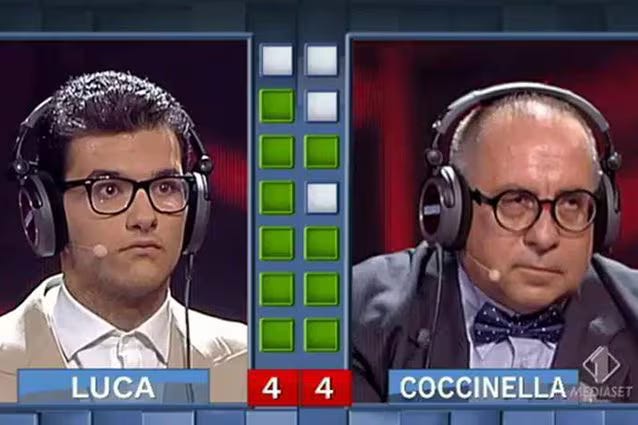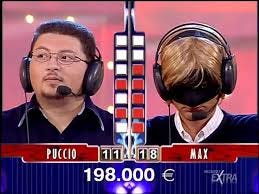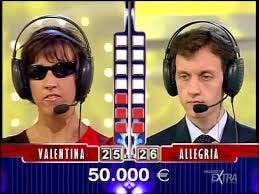Banda (transl. Gang, Strip)
Let's tune into today's word with an Italian iconic (and trashy) TV program.
🎙️ COME SI PRONUNCIA?
[BAN-dah]
🚨 Da non confondere con / Not to be confused with:
PANDA (Panda)
BENDA (Bandage)
SOSTANTIVO FEMMINILE
FEMININE NOUN
Band, Group.
🇮🇹 Gruppo di persone unite per uno scopo comune, specialmente in ambito musicale o criminale.
🇬🇧 A group of people united for a common purpose, especially in musical or criminal contexts.
Strip, Band.
🇮🇹 Striscia o fascia di materiale, spesso usata per legare o decorare.
🇬🇧 A strip or belt of material, often used for binding or decoration.
💬 ESEMPI
La banda del paese suona ogni domenica in piazza.
The town band plays in the square every Sunday.
La polizia lotta contro le bande criminali.
The police fight against gangs.
La banda magnetica della carta di credito si è rovinata.
The magnetic stripe on the credit card has been damaged.
🔎 L’ORIGINE DELLA PAROLA
🇮🇹 Banda deriva dal gotico bandi, che significa "legame". La radice indoeuropea è badh o bandh, che vuol dire "legare". Questa radice si ritrova in molte lingue:
nel tedesco Band
nell'inglese bind
nel sanscrito bandha
Originariamente indicava una striscia o fascia per legare o sostenere qualcosa. Col tempo, il significato si è esteso a indicare un gruppo di persone unite per uno scopo comune, come suonare musica o combattere.
🇬🇧 Banda comes from the Gothic word bandi, meaning "tie" or "bond". The Indo-European root is badh or bandh, meaning "to bind". This root is found in many languages:
German Band
English bind
Sanskrit bandha "Band"
It originally referred to a strip or band used for tying or supporting something. Over time, the meaning extended to indicate a group of people united for a common purpose, such as playing music or fighting.
🤓 LO SAPEVI CHE…
IMPRESS YOUR ITALIAN FRIENDS WITH CURIOUS FACTS ABOUT ITALY AND ITS CULTURE
🇮🇹 Sarabanda: una banda musicale e una banda di sbandati (più uno bendato)
Oggi avrei potuto scrivere della Banda Bassotti, della canzone di Ivano Fossati La mia banda suona il rock, oppure sul perché nelle città italiane si trovino strade chiamate Bande Nere. Ma non potevo perdere l’occasione di parlarti di un pezzo di cultura (trash) italiana che ha segnato un’intera generazione.
Correva l'anno 1997. Italia 1, il canale Mediaset dedicato ai giovani e all’intrattenimento, decise di lanciare un nuovo formato di quiz musicale, basato su quello americano Name That Tune.
Ed ecco che entra in scena lui, l'inimitabile Enrico Papi. Con l'energia di mille caffè e l'entusiasmo di un bambino a Disneyland, Papi trasforma ogni puntata in un rodeo musicale. IL GIOCO DELLA MOOOSECA (“musica”) diventa il grido di battaglia di un'intera generazione.
E i concorrenti? Oh, i concorrenti. Veri e propri personaggi con i loro nomi e soprannomi. C'era Valentina, la concorrente non vedente con un orecchio così fine da far sembrare Beethoven un dilettante. C'era Coccinella (Marco Manuelli), all'apparenza una persona normale, che poi si rivelava un jukebox pronto a divorare gettoni d'oro (nei giochi a premi italiani si vincevano monete d’oro che poi andavano convertite in denaro). C'era Max (Giulio De Pascale), che si presentava con una benda sugli occhi come un supereroe per non essere riconosciuto. E poi l'Uomo Gatto, (Gabriele Sbattella), l'incarnazione perfetta del concorrente assurdo che solo Sarabanda poteva produrre, una fabbrica di momenti che sarebbero diventati meme ante litteram.




Ma il vero colpo di genio? La frase "La indovino con una!". Quattro parole che racchiudevano tutta l'essenza di Sarabanda: l'arroganza, la sfida, la gloria effimera di riconoscere una canzone dopo una singola nota. Era il nostro "Veni, vidi, vici", e capita di sentirlo ancora adesso in Italia.
Sarabanda non era solo un quiz. Era un'arena, un circo, un parco giochi musicale dove il confine tra genio e follia era più sottile di una corda di violino. Era il luogo dove la cultura pop italiana si mostrava in tutta la sua gloriosa, assurda bellezza.
E noi? Noi eravamo lì, incollati allo schermo, a urlare risposte, a ridere, a disperarci per il concorrente a cui ci eravamo affezionati e che, dopo uno, due o tre mesi perdeva e lasciava il posto al prossimo.
Sarabanda ha fatto di più che intrattenerci. Ci ha fatto scoprire musica nuova, ci ha fatto apprezzare i classici, ci ha fatto sentire tutti un po' esperti musicali. Ha trasformato la musica da sottofondo a protagonista delle nostre serate.
🇬🇧 Sarabanda: a musical band and a band of misfits (plus a blindfolded one)
Today, I could have written about La Banda Bassotti (the Beagle Boys), Ivano Fossati's song La mia banda suona il rock (My band plays rock), or why in Italian cities you find streets called Bande Nere (Black Bands - it's related to the Medici). But I couldn't miss the chance to tell you about a piece of Italian (trashy) culture that marked an entire generation.
It was 1997. Italia 1, the Mediaset channel dedicated to youth and entertainment, decided to launch a new music quiz format based on the American show "Name That Tune".
And then he enters the scene, the inimitable Enrico Papi. With the energy of a thousand coffees and the enthusiasm of a child at Disneyland, Papi transforms each episode into a musical rodeo. "IL GIOCO DELLA MOOOSECA" (THE GAME OF MUUUSIC) becomes the battle cry of an entire generation.
And the contestants? Oh, the contestants. Real characters with their names and nicknames. There was Valentina, the blind contestant with an ear so fine she made Beethoven seem like an amateur. There was Coccinella (Ladybug, Marco Manuelli), seemingly an average person, who turned out to be a jukebox ready to devour gold tokens (in Italian game shows, you won gold coins that had to be converted into cash). There was Max (Giulio De Pascale), who appeared blindfolded like a superhero to avoid being recognized. And then there was Uomo Gatto (Cat Man, Gabriele Sbattella), the perfect incarnation of the absurd contestant that only Sarabanda could produce, a factory of moments that would become memes before memes were even a thing.
But the real stroke of genius? The phrase "La indovino con una!" (I can guess it with one note!). Four words that encapsulated the entire essence of Sarabanda: the arrogance, the challenge, the temporary glory of recognizing a song after a single note. It was our "Veni, vidi, vici," and you can still hear it in Italy today.
Sarabanda wasn't just a quiz show. It was an arena, a circus, a musical playground where the line between genius and madness was thinner than a violin string. It was the place where Italian pop culture showed itself in all its glorious, absurd beauty.
And us? We were there, glued to the screen, shouting answers, laughing, despairing for the contestant we had grown fond of and who, after one, two, or three months, would lose and make way for the next one.
Sarabanda did more than entertain us. It made us discover new music, appreciate the classics, and feel like music experts. It transformed music from background noise to the protagonist of our evenings.
👉 YOUR TURN
Can you use the word BANDA correctly in a sentence?
Based on the definition and examples provided, write a sentence using today's word of the day and share it as a comment on this post. It is important that your sentence makes sense and shows that you understand the word's definition, but we also encourage you to use creativity and have fun.









In alcuni culture è tradizione quando muore qualcuno di indossare una banda nera al braccio.
Quando ero giovane ( un sacco d'anni fa) suonavo la chitarra in una banda di rock. Ci chiamavamo " NON CI ASCOLTARE".